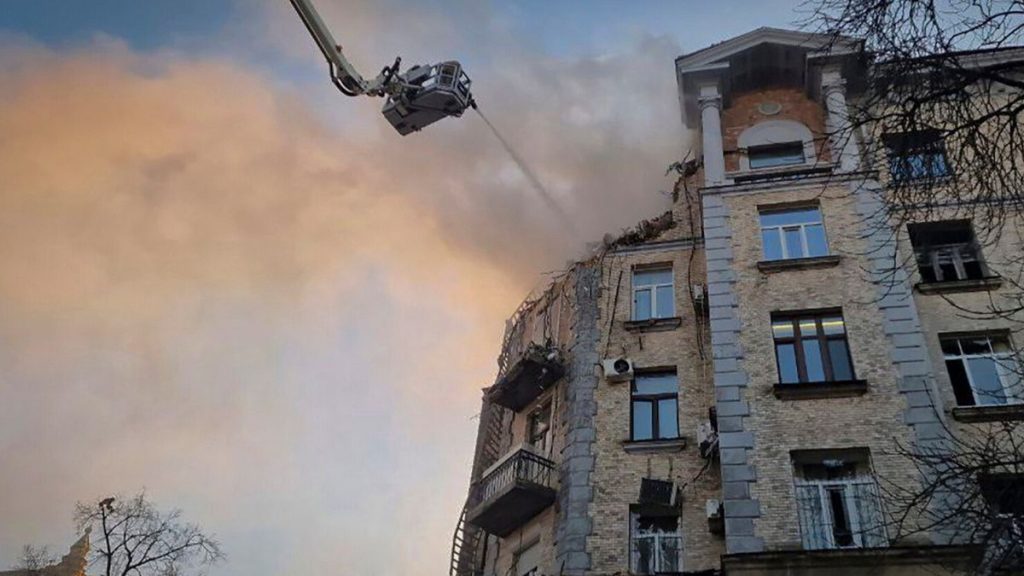The war in Ukraine continues to inflict devastating losses, extending beyond the battlefield and into the heart of the nation’s intellectual and scientific community. The tragic death of prominent neurobiologist Ihor Zyma and his wife, biologist Olesia Sokur, in a New Year’s Day attack on Kyiv underscores the indiscriminate nature of the conflict and the profound human cost of Russia’s aggression. Both scientists dedicated their careers to research and education at the Taras Shevchenko National University, contributing significantly to the advancement of biological sciences in Ukraine. Their loss represents a significant blow to the academic community and a poignant reminder of the war’s far-reaching consequences. The attack, believed to be a drone strike, targeted a residential area in Kyiv’s Pecherskyi district, highlighting the vulnerability of civilians even far from the front lines. Education Minister Oksen Lisovyi mourned their deaths, condemning Russia’s actions as an embodiment of “absolute evil” and calling for a strong international response. The couple’s demise serves as a stark illustration of the human toll exacted by the ongoing conflict, extending beyond military casualties to encompass the loss of invaluable intellectual capital and human potential.
The tragic incident involving Zyma and Sokur is not an isolated event but rather a grim reflection of the escalating violence across Ukraine. Following the New Year’s Day attack, subsequent Russian airstrikes continued to claim civilian lives and inflict widespread damage. Reports from regional authorities paint a bleak picture of the relentless bombardment and its devastating impact on communities across the country. In Kherson, two civilians were killed and six injured as Russian strikes targeted civilian infrastructure, high-rise buildings, and residential homes. Similar attacks in Zaporizhzhia and Donetsk resulted in further civilian casualties, underscoring the widespread nature of the violence and the constant threat faced by Ukrainian citizens. These attacks not only inflict immediate physical harm but also contribute to a pervasive atmosphere of fear and uncertainty, disrupting daily life and eroding the social fabric of affected communities. The continued targeting of civilian areas raises serious concerns about the adherence to international humanitarian law and underscores the urgent need for a peaceful resolution to the conflict.
The nature of the attacks, particularly the use of drones, reveals a concerning shift in Russia’s tactics. The Ukrainian Air Force reported that Russia launched a barrage of 72 drones, including Iranian-designed Shahed drones, against Ukraine overnight. While Ukrainian air defenses managed to intercept a significant number of these unmanned aerial vehicles, the sheer volume of the attack highlights the growing reliance on drone warfare in the conflict. The use of Shahed drones, known for their affordability and relative ease of deployment, raises concerns about the potential for escalating attacks on civilian targets. These drones, though less sophisticated than traditional military aircraft, pose a significant threat due to their ability to penetrate air defenses and inflict damage on infrastructure and civilian populations. The increasing deployment of drones signals a disturbing trend in the conflict, potentially signifying a shift towards more indiscriminate and widespread attacks, further endangering civilian lives and exacerbating the humanitarian crisis.
The attacks, both on Kyiv and other regions, exemplify the devastating impact of the war on Ukrainian society. The loss of prominent scientists like Zyma and Sokur represents a significant setback for the country’s intellectual and scientific progress. The targeting of civilian infrastructure, including residential buildings and hospitals, underscores the disregard for human life and the blatant violation of international humanitarian law. The ongoing violence disrupts essential services, displaces populations, and inflicts profound psychological trauma on individuals and communities. The cumulative effect of these attacks is a deepening humanitarian crisis, with millions of Ukrainians facing displacement, food insecurity, and limited access to healthcare. The war’s long-term consequences extend far beyond the immediate casualties, threatening the social, economic, and psychological well-being of the nation.
The international community faces a critical imperative to address the escalating violence and the humanitarian crisis unfolding in Ukraine. The deaths of Zyma and Sokur, along with countless other civilian casualties, highlight the urgent need for a concerted international effort to bring an end to the conflict. Continued diplomatic pressure, economic sanctions, and humanitarian aid are essential to mitigate the suffering of the Ukrainian people and to hold those responsible for the atrocities accountable. The indiscriminate targeting of civilians and the use of increasingly lethal weaponry demand a strong and unified response from the international community, including investigations into potential war crimes and violations of international law. A failure to act decisively risks further escalation of the conflict and a deepening of the humanitarian crisis, with devastating consequences for Ukraine and the broader region.
The ongoing war in Ukraine stands as a stark reminder of the devastating consequences of armed conflict and the urgent need for peaceful resolutions. The tragic deaths of Ihor Zyma and Olesia Sokur, along with the countless other victims of this senseless violence, underscore the human cost of war and the imperative to prioritize diplomatic solutions. The international community must redouble its efforts to support Ukraine, hold those responsible for the atrocities accountable, and work towards a just and lasting peace. The future of Ukraine and the stability of the region depend on a concerted and sustained commitment to ending the conflict and rebuilding a future based on peace, respect for human rights, and international cooperation. The memory of those lost, including the dedicated scientists whose lives were tragically cut short, should serve as a constant reminder of the importance of peace and the devastating consequences of its absence.














